FROM August 1st, 2019
To mark this year’s World Breastfeeding Week, which will take place from 1st to 7th August, the Wellbeing Foundation Africa is set to host a week-long series of activities targeted at new mothers with the aim of fostering proper nutrition by promoting breastfeeding. Events will be held across MamaCare Antenatal and Postnatal Education classes in hospitals across Lagos, Kwara, Osun States and Abuja to empower mothers to breastfeed properly, helping their babies start strong for a better future.
This year’s World Breastfeeding Week, which has the theme “Empower Parents; Enable Breastfeeding”, will give the Wellbeing Foundation Africa the opportunity to create awareness on optimal breastfeeding practices, including early initiation to breastfeeding within the first hour of birth, exclusive breastfeeding for the first six months, and proper complimentary feeding after the first six months.
The Founder-President of the Wellbeing Foundation Africa, H.E. Mrs Toyin Ojora Saraki, commented: “This year’s World Breastfeeding Week is an opportunity for the organization to highlight the successes of our Alive and Thrive Infant and Young Child Feeding programme, and our flagship MamaCare Antenatal and Postnatal Education programme, both of which have effectively delivered in their mandate to promote maternal and child health, particularly the strengthening of breastfeeding practices for improved health of newborns.

As Founder-President of the Wellbeing Foundation Africa, the private sector health facilities implementing partner of the Alive and Thrive Infant and Young Children Feeding and Nutrition Initiative in Lagos and Kaduna States, and the developer of the innovative MamaCare Antenatal and Postnatal Education Programme, I am delighted with the level of success achieved by both programmes within the last couple of years, particularly in improving infant and child nutrition.
I am encouraged by the progress achieved and we are determined to use this World Breastfeeding Week as a milestone to re-commit to the objective of preventing illness, stunting and malnutrition, ensuring the healthy growth and development of infants and young children through improved breastfeeding and complementary feeding practices. The Wellbeing Foundation Africa recognizes and promotes the importance of breast milk for premature and sick neonates as the first and optimal nutrition in fragile situations.”
Malnutrition accounts for more than 50% of under-five mortality in the state. Infant Mortality rate is at 103 per 1000 live births (NDHS 2013), while under-5 mortality rates are at 169 per 1000 live births (NDHS 2013). The rate of timely breastfeeding initiation is 28.9% (MICS 2017), with only 19.7% of children being exclusively breastfed (MICS 2017), and only 10% of children aged 6 – 23 months were fed appropriately. Within the State, 11.7% of children are wasted from acute under nutrition, 47% of children under-5 years are stunted, while 34% are under weight (MICs 2017).
FROM July 26th, 2019
Toyin Saraki, Special Adviser to the Independent Advisory Group to the WHO Regional Office for Africa, has welcomed World Health Organization Director-General Dr Tedros Adhanom Ghebreyesus back to Nigeria.
Dr Tedros, who will address the (TEF) annual Entrepreneurship Forum in Abuja, visits Nigeria with the country on the verge of being declared free from the blight of polio. Toyin Saraki has long campaigned for the eradication of polio and urged for the issue to be understood within the context of health security in Nigeria.
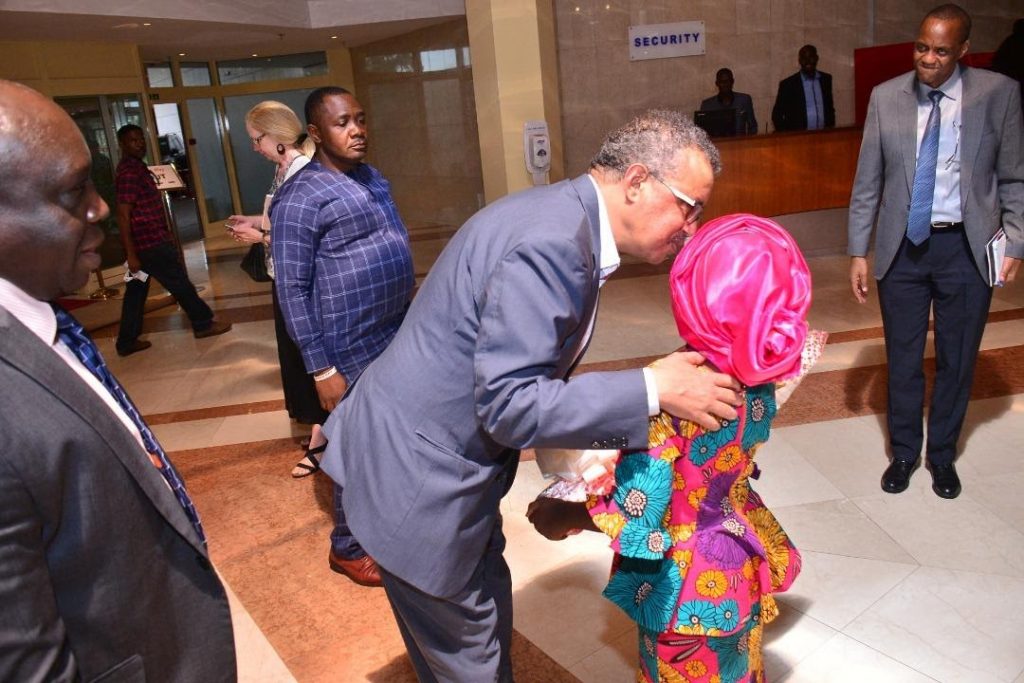
In her welcome remarks to Dr Tedros, Mrs Saraki commented:
“I was encouraged by the progress we made together at the World Health Assembly in May, in particular our joint focus on water, sanitation and hygiene which led to ground-breaking resolutions and commitments. Our meetings and our discussion at the symposium ‘Why water, sanitation and hygiene must be a priority for quality healthcare’ organised by the Governments of Zambia, Tanzania, Sweden, Japan, Germany and Eswatini; the World Health Organization and WaterAid, gave me great confidence that the WHO is leading progress on WASH around the world, in particular with the strong regional leadership provide by Dr. Moeti, the WHO antibiotic resistance (AMR) team and the WHO Public Health, Environmental and Social Determinants of Health (PHE) department”.
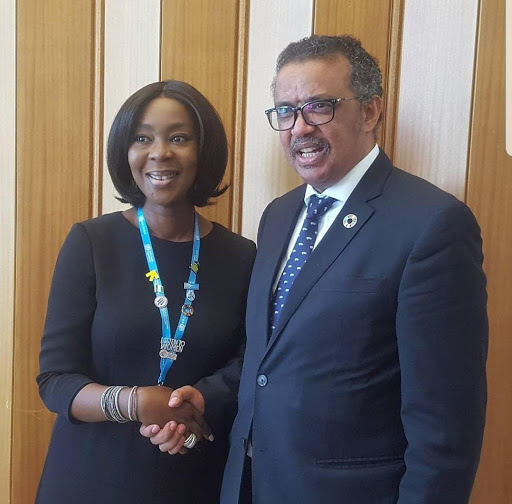
“Your assertion that healthcare workers should not be regarded as a cost, but rather as “an investment that pays a triple return for health, gender equality and economic growth,” is one that Governments must understand and adopt if we are to successfully address the shortfall of 18 million health workers needed to achieve and sustain universal health coverage by 2030.”
“At the Wellbeing Foundation Africa, of which I am the Founder-President, we have undertaken a ground-breaking partnership with Johnson & Johnson and the Liverpool School of Tropical Medicine across the whole of Kwara State. Our focus on Emergency Obstetrics and Newborn Care (EmONC) training in healthcare facilities to improve health outcomes for mothers and their newborns has resulted in a 15% reduction in the maternal case fatality rate and a 38% reduction in the still birth rate in health care facilities where the project is implemented. This programme, along with our Mamacare and Mamacare+N programme, in partnership with UNFPA, is part of our commitment to increasing the numbers of skilled healthcare workers in line with WHO recommendations”.
“As we discussed extensively during your previous visits to Nigeria, the landmark adoption by the 8th Senate of the Federal Republic of Nigeria of the one percent Consolidated Revenue Fund (CRF) for the Basic Health Care Provision Fund (BHCPF) was a historic move towards achieving universal health coverage. However, we are still far from realising that goal, which will require significant political commitment. That commitment will only be successful with adequate investment in primary healthcare.”
“I warmly welcomed the adoption of Resolution EB144/CONF./2 Rev.1: Water, sanitation and hygiene in health care facilities at the 144th World Health Organization Board Meetings because it recognises that Primary Health Care is a cornerstone of a sustainable health system for effective universal health coverage, and justifies my Wellbeing Foundation Africa’s efforts to improve hygiene in health facilities, reducing the incidence of maternal sepsis, the 2nd highest causative factor of morbidity nationally. As a strong Primary Health Care system is essential for safe WASH conditions in Nigeria, so too it must form the backbone of efforts to improve health outcomes for women, children and adolescents throughout the country – and provide the resilience across the raft of WHO normative functions.”
Toyin Saraki is also the Founder-President of the Wellbeing Foundation Africa, the Global Goodwill Ambassador to the International Confederation of Midwives, and a member of the Concordia Leadership Council.
FROM July 12th, 2019
Thank you to the Dutch Government, Bernard van Leer Foundation, the International Confederation of Midwives, and the Dutch Taskforce for Healthcare for hosting us and facilitating this 23rd Board Meeting.
I would like to commend Preeti Sudan for her leadership as PMNCH Board Chair and congratulate Helen Clark upon her appointment as the new Chair. I look forward to working with both of you and all stakeholders to further our shared values and commitment to ensuring that women’s, children’s and adolescents’ health (WCAH) is at the top of national, regional and global agendas. I think it is right, therefore, that the Board Meeting seeks to evaluate and enhance its political engagement at all levels.
At the World Health Assembly this year, alongside Helga Fogstad, PMNCH Executive Director, Dr Tedros Adanhom Ghebreyesus, WHO Director General, and Her Excellency Mrs Emine Erdogan, First Lady of The Republic of Turkey. I commended PMNCH’s Call to Action on Aligning Women’s, Children’s and Adolescents’ Health and Wellbeing in Humanitarian and Fragile Settings.

Given that more than two billion people live under the threat of conflict and emergencies of diverse and complex natures, and that 69 million people have been displaced by humanitarian crises, we need bold steps to enhance coordination and bring together synchronized knowledge, policies and actions for a whole-system approach to achieving health for all, routinely across nations, in order to build the resilience for effective responses in protracted emergencies and in the humanitarian-development nexus. That is why I so strongly support PMNCH’s initiative and call to action, which is best placed to bring us all together – from every sector, region, country and background – to remove the inefficiencies, identify and address gaps of capacity and delivery in every sense.
PMNCH is uniquely positioned to mobilise broader political strategies, and partnerships of all kinds, as it can act as the standard-bearer and interlocutor between the WHO, global institutions, CSOs, governments, the private sector and frontline healthcare workers. This support is invaluable to Governments and healthcare providers, who we can consider to be the duty-bearers.
At the Wellbeing Foundation Africa, of which I am the Founder-President, we have learned the value which emanates from engagement with PMNCH in Nigeria, as members who supported the ‘Saving One Million Lives’ campaign initiated at the PMNCH Board Meeting in 2012 at Abuja, for the promotion of routine administration of the reinforced ORS-Zinc formula for management of diarrhoea, and the Midwives Service Scheme, a public sector collaborative initiative, designed to mobilize midwives, including newly qualified, unemployed and retired midwives, for deployment to selected primary health care facilities in rural communities.


I can report from Nigeria, as an NGO partner of the Federal Ministry of Health’s RMNCAHN Critical Core Committee, that whilst there has been a significantly improved focus on surveillance across health security targets, and a growing acceptance of the fact that suitable civil registration and vital statistics systems will be essential if we are to achieve universal health coverage – I hope that these milestones in accountability also able to catalyse improved services at the frontline. That can only be achieved with expanded and dedicated multi-sectoral investments in primary health, which align towards the existing funding mechanisms of the Basic Health Care Provision Fund BHCPF, the National Health Insurance Scheme, and the expectedly imminent National Health Account.
I strongly support the PMNCH position that we must put women, children and adolescents at the heart of universal health coverage. Given that 38% of Nigerian women and newborns die due to mismanagement of complications during delivery, and a further 17% perish due to maternal sepsis within a week of birth, the relationship between achieving health for all, upskilling of healthcare workers, WASH, Hygiene in Health Facilities, and WCAH must be at the core of our advocacy to political leaders and policymakers, as the former is simply unachievable without significant improvements to the latter.
It is of course no coincidence that women, children and adolescents – despite accounting for 60% of the global population – tend to constitute the groups with the least political influence and power, which is why United Nations, WHO and national policies must explicitly highlight and focus on WCAH as part of their UHC strategies.
Only then can we claim to be truly working towards the principle of “leaving no one behind,” which is central to the Sustainable Development Goals and the Global Strategy for Women’s, Children’s and Adolescents’ Health (2016–2030).

On a final note, as the Global Goodwill Ambassador for the International Confederation of Midwives, one of our co-hosts this week, I must highlight the launch at the World Health Assembly this year, of the report ‘Strengthening quality midwifery education for Universal Health Coverage 2030: A transformative approach to improving quality of care’ produced by ICM, alongside WHO, UNFPA and UNICEF. Women and newborns are the most vulnerable in humanitarian and fragile settings where quality midwifery education saves lives by preparing all midwives to legislate for and respond to emergency health situations. As a critical element in achieving UHC and WCAH, I am sure that we all know that midwives can and do lead the way.
As Nigeria’s first and oldest country member of this esteemed and dedicated alliance, I am honoured by the Wellbeing Foundation Africa’s PMNCH Board Observer Privileges, and delighted to extend a warm welcome to Helen Clark, former Prime Minister of New Zealand, as Chair of PMNCH – who I know will ensure that women’s, children’s and adolescents’ health and wellbeing are reinforced as a global priority. Thank you.
FROM July 2nd, 2019
Yesterday in Abuja the Nigeria Chapter of the African Women Leaders Network (AWLN) was launched.
The African Women Leaders Network advocates for increased women’s participation in decision-making, fosters collaboration and evolves a national vision to support women’s empowerment and leadership in line with Africa’s Agenda for 2063, the Sustainable Development Goals, and the United Nations Security Council Resolution 1325 on Women, Peace and Security.

In her address to the launch – AWLN – The Journey So Far – Toyin Saraki applauded the launch:
“Thank you also to the Federal Government of Germany, the African Union, UN Women, and all partners and stakeholders who have made this historic moment possible.”
“As we mark the launch of the African Women Leaders’ Network Nigeria Chapter, I urge all of you to look around at the women who have joined us today. We are surrounded by women leaders: role models for women all around the country. As we navigate the way forward, which will sometimes be arduous, I know that we can look to this strong network of sisters to forge onwards together”
“All of us here know, however, that leaders are not bred in a day. Over the next year, and beyond, it will be essential for us to map and demonstrate the talent that we have in this country – superbly talented women leaders – but also to communicate the challenges and barriers faced by women which must be overcome for us to stand shoulder to shoulder with men at every level, in every country, in every region around the world. That is why the national and regional consultations which will be undertaken by AWLN are so important, as part of a wider effort to identify the true demographics of Nigeria. If we can discern the population for the purposes of an election, we must also be able to establish a comprehensive civil registration and vital statistics system, which allows us to allocate resources accordingly for health, community-engagement and infrastructure.”

“Only with that understanding can we effectively implement the necessary investments through the life course of a girl and woman. Gender development, if done effectively and led by local communities, will breed women leaders.”
“Let us remove the barriers to women’s leadership, and restore the bridges to Nigeria’s productivity.”
The launch, which was addressed by H. E. Aisha Muhammadu Buhari First Lady, Federal Republic of Nigeria (represented), UN Deputy Secretary-General, H. E. Dr. Amina Mohammed, Executive Director, UN Women, Ms. Phumzile Mlambo-Ngcuka, Mme. Bineta Diop AU Special Envoy on Women, Peace & Security, Ms. Glory Ohagwu, OAP, Voice of Nigeria, Ms. Comfort Lamptey, AWLN Nigeria Steering Committee, H. E. Bernhard Schlagheck, Ambassador of Germany, H.E. Jens-Petter Kjemprud, Ambassador to Norway, UN Resident Coordinator Edward Kallon, Dr. Tunji John Asaolu, Country Representative, African Union. The Launch was concluded by Former Ambassador Nkoyo Toyo, Chairperson of the Steering Committee of AWLN Nigeria, with the presentation of the Call To Action.
FROM June 21st, 2019
The Wellbeing Foundation Africa yesterday joined philanthropies, NGOs, faith-based organizations, financial institutions, corporations, and universities at a historic convening to announce new and wide-ranging commitments to improve water, sanitation, and hygiene (WASH) conditions in healthcare facilities.
45% of healthcare facilities in ‘Least Developed Countries’ lack basic water services, and 1.5 billion people around the world have to use healthcare facilities without basic sanitation. The impact on infant and maternal mortality, pandemic and infection prevention, and control, and antibiotic resistance, is devastating and well-documented; taking on a sharper dimension in fragile and humanitarian situations.”
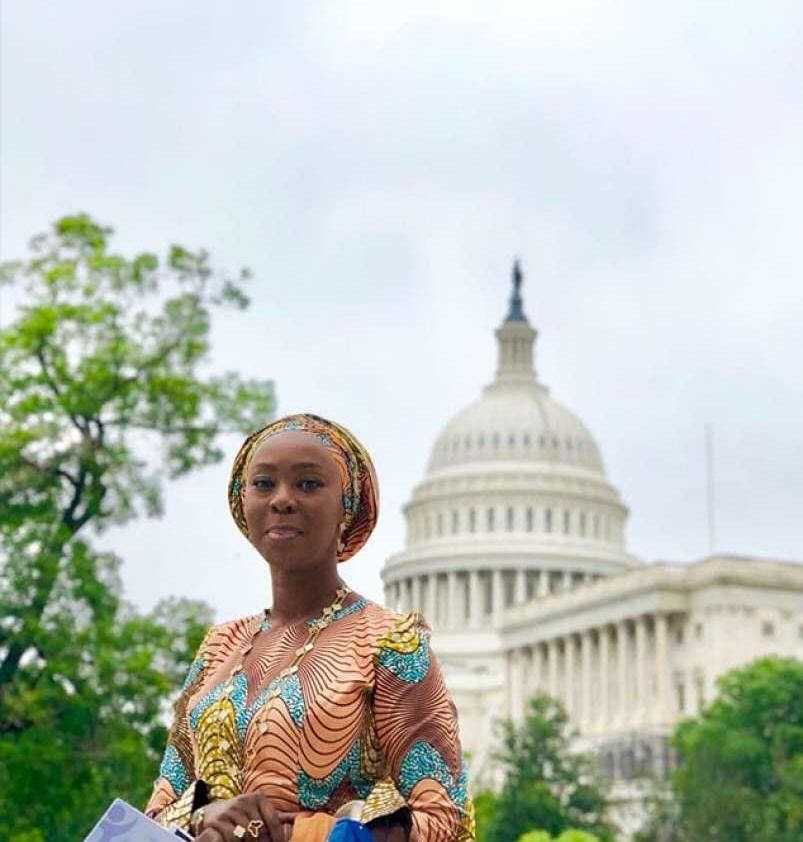
The new commitments follow the launch last year of a global WASH campaign by Toyin Saraki, Founder-President of the Wellbeing Foundation Africa and Special Adviser to the Independent Advisory Group to the World Health Organization Regional Office for Africa, who welcomed the new commitments, commenting:
“I commend our global partners gathered in Washington DC for driving the issue of water, sanitation and hygiene in healthcare facilities forward so quickly.”
“These commitments are truly unprecedented and reflect the catalytic progress and impact of unprecedented advocacy at local, regional and global levels.”
“In response to the UN Secretary General António Guterres’ Call to Action on World Water Day in March 2018, I retraced the steps of each of the programmes undertaken by the Wellbeing Foundation Africa and launched its new “Clean Hands For All” WASH campaign with the World Health Organization in Nigeria.”
“I committed to work with my partners in the global health and development communities to stop mothers and newborns from dying from preventable and unnecessary complications, simply because the most basic of WASH services are not available, and to ensure that all countries implement the 2017 World Health Assembly Sepsis Resolution. Hand hygiene must be a quality indicator in every facility and a national marker of health care quality, with access to soap and water monitored and assessed.”
“To that end I conducted high-level meetings at the US State Department, with the World Bank, and with Congress to accelerate progress on WASH – and in many cases reverse worsening trends and indicators.”
“At the World Health Assembly last month in Geneva, I spoke in favour of the historic WASH resolution, and was delighted when, for the first time, the 194 WHO Member States joined together to acknowledge this global health crisis and move toward concrete action.”
“That resolution, combined with the unprecedented commitments made today, represent a leap forward in improving WASH conditions in Nigeria and around the world and have the potential to save millions of lives.”
“The Wellbeing Foundation has committed to disseminating information and advocacy regarding WASH standards through its influential MamaCare midwives and our partnership with Unilever Lifebuoy, teaching about WASH in healthcare facilities and schools, continuing its #WASHWednesday advocacy campaign, and developing our WASH for Healthcare Facilities Proper Cleaning programme.”
“Having successfully introduced and intensified our WASH for Wellbeing hygiene in health care facilities techniques to health workers and patients in over 570 medical facilities in 5 states of Nigeria, our challenge remains taking those standards to a national scale in Nigeria’s 36 states of the federation – to that end I was encouraged by the speech in November last year given by His Excellency President Muhammadu Buhari declaring a state of emergency in water, sanitation and hygiene in Nigeria and launching the National Plan of Action.”
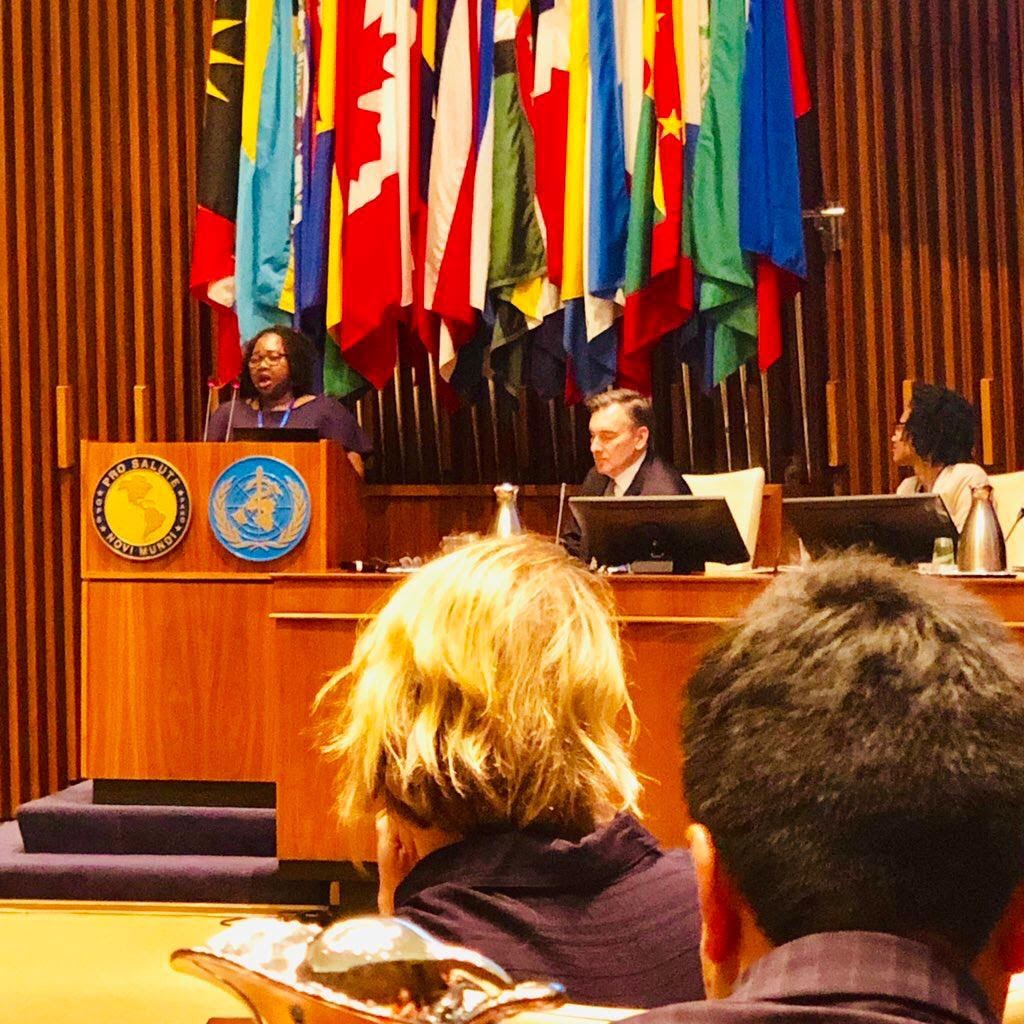
The new commitments catalyse funding, technical assistance, business strategies, research and advocacy.
Representatives from UNICEF, WHO, World Bank, U.S. government (CDC, USAID, Dept. of State) and select ambassadors to the U.S. were also in attendance, alongside a delegation from the Wellbeing Foundation Africa, to take part in the historic commitments.
FROM June 13th, 2019
To catalyse new global and regional commitments 25 years after Cairo Summit
In a significant high-level global gender and rights commitment, Founder-President of the Wellbeing Foundation Africa (WBFA) Toyin Saraki has accepted the official invitation of the United Nations Population Fund UNFPA, the United Nations’ foremost sexual and reproductive health rights agency, to join the International Steering Committee of the International Conference on Population and Development, taking place in Nairobi in November 2019.
Convened by the Governments of Kenya and Denmark, and the UNFPA, the ICPD25 Summit in Nairobi from 12–14 November 2019 will bring together heads of state and ministers, parliamentarians, thought-leaders, technical experts, civil society organizations, young people and people with disabilities, business and community leaders, faith-based organizations, international financial institutions, academics and thousands of others interested in the pursuit of reproductive health and rights, in order to mobilize the political will and financial commitments needed to deliver on the commitments made by 179 governments in Cairo in 1994 at the landmark International Conference on Population and Development, the ICPD.
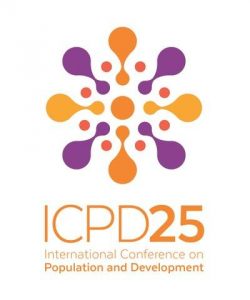
Mrs Saraki joins the ICPD International Steering Committee with a focus on mobilising global and country commitments around five themes:
• Universal access to sexual and reproductive health and rights as a part of universal health coverage
• Financing required to finish the ICPD Programme of Action and to sustain the gains made
• Drawing on demographic trends to drive economic growth and achieve sustainable development
• Ending gender-based violence and harmful practices
• Upholding the right to sexual and reproductive health care even in humanitarian and fragile contexts
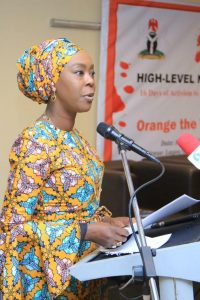
Having commenced her new high-level global commitment during multi-lateral meetings at Women Deliver in Vancouver last week, Mrs Saraki commented:
“We stand on a gender precipice, from which we must urgently act to transform the lives of women and children. Together with my fellow members of the ICPD International Steering Committee, I envisage a world where every individual and couple, everywhere, can decide freely when to have children, and has the information, education and means to do so. A world where no woman or girl dies from preventable complications in pregnancy or childbirth: where no woman has to give birth without the help of a midwife, nurse or doctor. We must forge a world where no one is subjected to violence because of their gender, where no girl is forced to marry, where no girl or woman is subjected to female genital mutilation or other harmful practices.”
“We are far from the world envisaged by the conference in Cairo 25 years ago. 830 women die every day while giving life, mostly from preventable causes. 33,000 girls are forced into child marriage and 11,000 girls face genital mutilation every day. 5 million pregnant women have been displaced by conflict or disaster and are in need of medical care. They all deserve a better world, across the life-course, from birth to age”
“I am therefore delighted to serve as a member of this important global committee, bringing Africa’s voice to the fore. I look forward to deepening Nigeria’s pivotal national consultations on gender, population and development, in conjunction with the UNFPA Nigeria country office, alongside the International Steering Committee’s global terms of reference.”
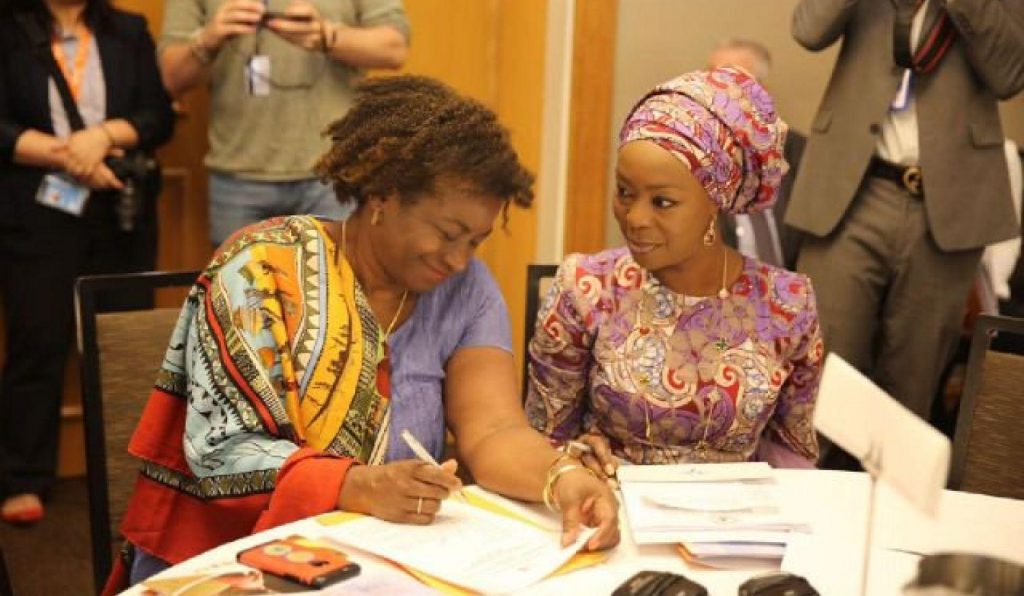
Dr. Natalia Kanem, UNFPA Executive Director, commented: “As we celebrate the remarkable progress we have made in advancing the health and rights of women, we must redouble our efforts to reach those who have not yet benefited from the promise of the ICPD. The Nairobi Summit will help us rally a broad coalition of stakeholders to protect the gains made and advance the ICPD agenda to ensure that no one is left behind.”
Mrs Saraki has also served as a pioneer member of the United Nations African Women’s Leadership Network since 2017, and is a contributor to the 2019 UK-France Governments’ International Consultative Dialogue for Prevention of Sexual Violence Initiative (PSVI). Mrs Saraki is the Global Goodwill Ambassador for the International Confederation of Midwives and a Special Adviser to the Independent Advisory Group of the World Health Organization Regional Office for Africa.
The UNFPA as core advocacy partner, seeks to catalyse and accelerate progress towards ‘the Three Zeros’ – three strategic results that it will work to achieve by 2030:
– zero unmet need for family planning;
– zero maternal deaths; and
– zero violence and harmful practices against women and girls, including child marriage and female genital mutilation.